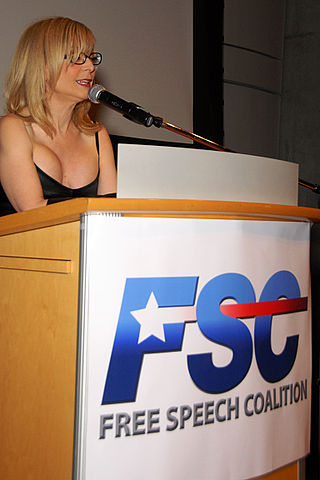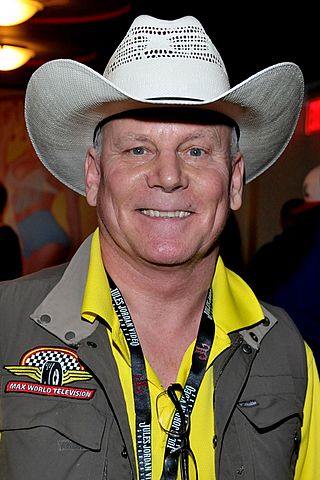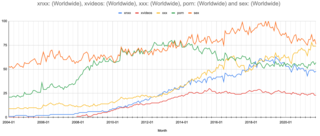Related Research Articles
Pornographic films (pornos), erotic films, adult films, sex films, 18+ films, or also known as blue films, are films that represent sexually explicit subject matter in order to arouse, fascinate, or satisfy the viewer. Pornographic films represent sexual fantasies and usually include erotically stimulating material such as nudity (softcore) and sexual intercourse (hardcore). A distinction is sometimes made between "erotic" and "pornographic" films on the basis that the latter category contains more explicit sexuality, and focuses more on arousal than storytelling; the distinction is highly subjective.

Hardcore pornography or hardcore porn is pornography that features detailed depictions of sexual organs or sexual acts such as vaginal, anal, oral or manual intercourse, ejaculation, and fetish play. The term is in contrast with less-explicit softcore pornography. Hardcore pornography usually takes the form of photographs, films, and cartoons. Since the mid-1990s, hardcore pornography has become widely available on the internet, making it more accessible than ever before.

In Japan, pornography has unique characteristics that readily distinguish it from western pornography. Pornographic films are known as "adult videos" (AV) in Japan, so Japanese adult videos (JAV) refers to the Japanese Adult Video industry. Animated films are referred to as hentai in English, but in Japan the terms "adult anime" and "erotic animation" are used. In addition to pornographic videos and magazines featuring live actors, there are now categories of pornographic manga and anime, and pornographic computer games.

Pornography has existed since the origins of the United States, and has become more readily accessible in the 21st century. Advanced by technological development, it has gone from a hard-to-find "back alley" item, beginning in 1969 with Blue Movie by Andy Warhol, the Golden Age of Porn (1969–1984) and home video, to being more available in the country and later, starting in the 1990s, readily accessible to nearly anyone with a computer or other device connected to the Internet. The U.S. has no current plans to block explicit content from children and adolescents, as many other countries have planned or proceeded to do.

John Stagliano, also known as Buttman, is an American entrepreneur, former pornographic film actor, producer and director who founded and owns the Evil Angel pornographic film studio.

Robert D. Zicari, also known as Rob Black, is an American pornographer, entrepreneur, podcaster and professional wrestling promoter. Together with his then-wife Janet "Lizzy Borden" Romano, he owned the porn company Extreme Associates. Zicari was prosecuted for distribution of obscenity by the United States Department of Justice in 2004. The case was dismissed but was reinstated upon appeal in 2005. Zicari entered into a plea agreement with the government in 2009, ending the case.

The Free Speech Coalition (FSC) is a non-profit trade association of the adult entertainment industry in the United States. Founded in 1991, it opposes the passage and enforcement of obscenity laws and many censorship laws.
Pornography has been defined as sexual subject material such as a picture, video, text, or audio that is intended for sexual arousal. Made for consumption by adults, pornography depictions have evolved from cave paintings, some forty millennia ago, to virtual reality presentations. A general distinction of adult content is made classifying it as pornography or erotica.
The National Center on Sexual Exploitation (NCOSE), previously known as Morality in Media and Operation Yorkville, is an American conservative anti-pornography organization. The group has also campaigned against sex trafficking, same-sex marriage, sex shops and sex toys, decriminalization of sex work, comprehensive sex education, and various works of literature or visual arts the organization has deemed obscene, profane or indecent. Its current president is Patrick A. Trueman. The organization describes its goal as "exposing the links between all forms of sexual exploitation".
Child erotica is non-pornographic material relating to children that is used by any individuals for sexual purposes. It is a broader term than child pornography, incorporating material that may cause sexual arousal such as nonsexual images, books or magazines on children or pedophilia, toys, diaries, or clothes. Law enforcement investigators have found that child erotica is often collected by pedophiles and child sexual abuse offenders. It may be collected as a form of compulsive behavior and as a substitute for illegal underage pornography and is often a form of evidence for criminal behavior.

Paul F. Little was an American pornographic actor, producer, and director better known by his stage name Max Hardcore. He rose to prominence in 1992 with the film series The Anal Adventures of Max Hardcore, which in 1994 was awarded the X-Rated Critics Organization's award for Best Amateur or Pro-Am series. Former AVN writer, Gerrie Lim, has classified Hardcore's works as gonzo pornography and "testing the limits of acceptability". He was a member of the X-Rated Critics Organization's Hall of Fame. He spent two and a half years in prison (2009–2011), convicted in a trial for obscenity.

Internet pornography is any pornography that is accessible over the Internet; primarily via websites, FTP connections, peer-to-peer file sharing, or Usenet newsgroups. The greater accessibility of the World Wide Web from the late 1990s led to an incremental growth of Internet pornography, the use of which among adolescents and adults has since become increasingly popular.
An obscenity is any utterance or act that strongly offends the prevalent morality of the time. It is derived from the Latin obscēnus, obscaenus, "boding ill; disgusting; indecent", of uncertain etymology. Generally, the term can be used to indicate strong moral repugnance and outrage in expressions such as "obscene profits" and "the obscenity of war". As a legal term, it usually refers to descriptions and depictions of people engaged in sexual and excretory activity.
In the United States, distribution of "obscene, lewd, lascivious, or filthy" materials is a federal crime. The determination of what is "obscene, lewd, lascivious, or filthy" is up to a jury in a trial, which must apply the Miller test; however, due to the prominence of pornography in most communities most pornographic materials are not considered "patently offensive" in the Miller test.

In the United States, child pornography is illegal under federal law and in all states and is punishable by up to life imprisonment and fines of up to $250,000. U.S. laws regarding child pornography are virtually always enforced and amongst the sternest in the world. The Supreme Court of the United States has found child pornography to be outside the protections of the First Amendment to the United States Constitution. Federal sentencing guidelines on child pornography differentiate between production, distribution, and purchasing/receiving, and also include variations in severity based on the age of the child involved in the materials, with significant increases in penalties when the offense involves a prepubescent child or a child under the age of 18. U.S. law distinguishes between pornographic images of an actual minor, realistic images that are not of an actual minor, and non-realistic images such as drawings. The latter two categories are legally protected unless found to be obscene, whereas the first does not require a finding of obscenity.
Feminist views on pornography range from total condemnation of the medium as an inherent form of violence against women to an embracing of some forms as a medium of feminist expression. This debate reflects larger concerns surrounding feminist views on sexuality, and is closely related to those on prostitution, BDSM, and other issues. Pornography has been one of the most divisive issues in feminism, particularly in Anglophone (English-speaking) countries. This division was exemplified in the feminist sex wars of the 1980s, which pitted anti-pornography activists against pro-pornography ones.
An anti-pornography movement in the United States has existed since before the 1969 Supreme Court decision of Stanley v. Georgia, which held that people could view whatever they wished in the privacy of their own homes, by establishing an implied "right to privacy" in U.S. law. This led President Lyndon B. Johnson, with the backing of Congress, to appoint a commission to study pornography. The anti-pornography movement seeks to maintain or restore restrictions and to increase or create restrictions on the production, sale or distribution of pornography.
Feminists Fighting Pornography was a political activist organization against pornography. It advocated for United States Federal legislation to allow lawsuits against the porn industry by women whose attackers were inspired by pornography. FFP was based in New York, N.Y., was founded in 1983 or 1984, and dissolved in 1997.

Fight the New Drug (FTND) is a nonprofit, secular, and non-legislative anti-pornography organization that is based in Utah. The group was founded in Utah in 2009. FTND describes pornography as analogous to a drug and argues that it is a public health crisis. It describes itself as asking people to "consider before consuming", rather than advocating anti-pornography legislation.

Money Shot: The Pornhub Story is a 2023 Netflix documentary about Pornhub and its parent company Aylo. It presents interview footage from sex workers, ex-Pornhub employees, journalists, and anti-sex-trafficking figures. The documentary focuses on a 2020 scandal over Pornhub hosting non-consensual pornography, including of children, and how the aftermath affected pornographic performers.
References
- 1 2 "NCOSE Honors Patrick A. Trueman Upon His Retirement as President". NCOSE. 9 January 2024.
- ↑ Healey, Jon (October 3, 2005). "Conservatives find allies in Congress". Tampa Bay Times . Retrieved April 25, 2020.
- ↑ Weitzer, Ronald (2019). "The Campaign Against Sex Work in the United States: A Successful Moral Crusade". Sexuality Research and Social Policy . 17 (3). Springer Science+Business Media: 399–414. doi:10.1007/s13178-019-00404-1. S2CID 256075724 . Retrieved May 18, 2020.
- ↑ Peterson, Bill (March 6, 1981). "Abortion Foes Gain Keys Federal Posts". The Washington Post .
- 1 2 "Patrick A. Trueman, Esq". National Center on Sexual Exploitation. Retrieved 11 June 2018.
- 1 2 Krause, Jason (February 1, 2008). "The End of the Net Porn Wars". ABA Journal . 94 (2): 52–56. Retrieved May 18, 2020.